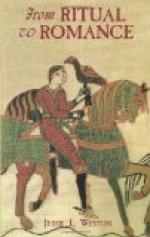but as models, a very different thing. Then the
statement is discredited by the fact that we possess
the writings of these men, and know them to be of
another character than Metrical Chronicles.
In the case of Wauchier his reference does not stand
alone; it is one of a group, and that group marked
by an extraordinary unanimity of statement; whoever
Bleheris may have been he was certainly possessed
of two definite qualifications—he knew a
vast number of tales, and he possessed a remarkable
gift of narration, i.e., he was a story-teller,
par excellence. Thus he was, a priori, a probable
source for that section of Wauchier’s work which
is attributed to him, a section consisting of short,
picturesque, and mutually independent tales, which
formed part of a popular collection. It is misleading
to speak as if Wauchier refers to him as general source
for his Perceval continuation; the references are
clearly marked and refer to Gawain tales. Apart
from the fact that Wauchier’s reference does
not stand alone we have independent evidence of the
actual existence of such a group of tales, in our surviving
Gawain poems, certain of which, such as Kay and the
Spit, and Golagros and Gawayne are versions of the
stories given by Wauchier, while the author of the
Elucidation was also familiar with the same collection.
If evidence for the identity of Bleheris is incomplete,
that for his existence appears to be incontrovertible.
Would it not be more honest if such a would-be critic
as the writer referred to said, ’I do not choose
to believe in the existence of Bleheris, because it
runs counter to my pre-conceived theory of the evolution
of the literature’? We should then know
where we are. Such a parallel as that cited above
has no value for those familiar with the literature
but may easily mislead the general reader. I
would also draw attention to the fact noted in the
text—the extreme improbability of Wauchier,
a continental writer, inventing an insular and Welsh
source. This is a point critics carefully evade.
[10] Cf. Bledhericus de Cornouailles, note contributed
by M. Ferd. Lot, to Romania, Vol. XXVIII.
p. 336. M. Lot remarks that he has not met with
the name in Armorica; it thus appears to be insular.
[11] Cf. Revue Celtique, 1911, A note on the identification
of Bleheris. [12] Ed. Rhys-Evans, Vol. II. p.
297; cf. also Revue Celtique. [13] In the course of
1915-16 I received letters from Mr Rogers Rees, resident
at Stepaside, Pembrokeshire, who informed me that he
held definite proof of the connection of Bledri with
both Grail and Perceval legends. The locality
had been part of Bledri’s estate, and the house
in which he lived was built on the site of what had
been Bledri’s castle. Mr Rogers Rees maintained
the existence of a living tradition connecting Bledri
with the legends in question. At his request
I sent him the list of the names of the brothers of
Alain li Gros, as given in the 1516 edition of the
Perlesvaus, a copy of which is in the Bibliothèque




